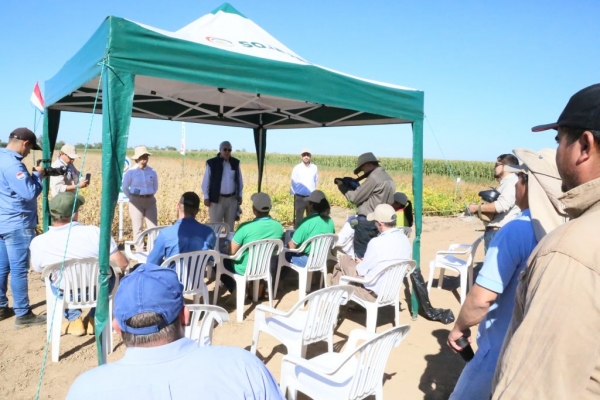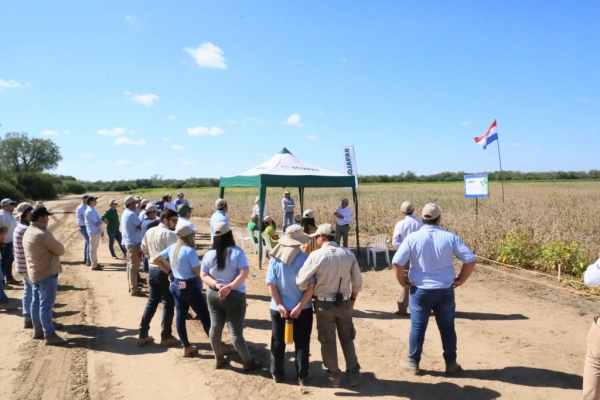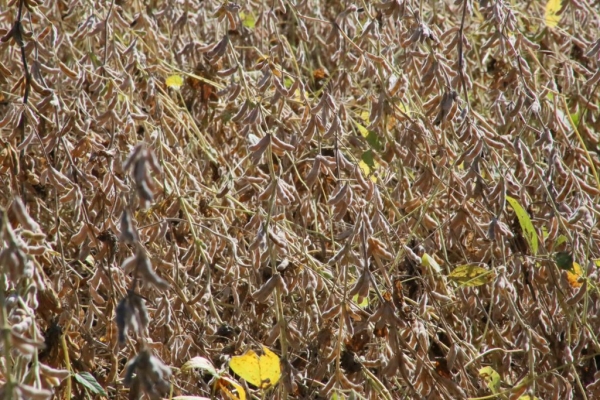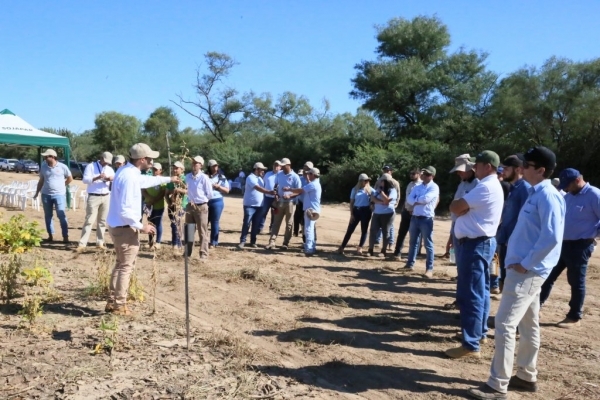



Chacoan soybean varieties will soon be a reality for producers
03/05/2023
The Institute of Agricultural Biotechnology (INBIO) held its "Soybean for the Chaco" field day at the evaluation plot of the Estancia Jerovia of Agropecuaria Carlos Casado S.A., in Mariscal Estigarribia, department of Boquerón. On the occasion, producers and technicians from the region were presented with the advanced lines developed by INBIO's Soybean Improvement Programme, focused on meeting the needs of producers in Chaco.
INBIO has been promoting the development of varieties generated in the Chaco region, which today is in the stage of selecting advanced lines in situ with the aim of making available as soon as possible soybean varieties specifically selected for producers in the region. The work that INBIO is carrying out at the Jerovia farm is part of the cooperation agreement signed with Agropecuaria Carlos Casado S.A.
The Deputy General Manager of Carlos Casado S.A., José María Peña, highlighted the joint work with INBIO for the generation of agricultural technology, pointing out that it is necessary to continue developing technology and knowledge in the region, so that production has a sustainable development. He assured that the most valuable capital they have is their committed human capital, who take the ideal of technology development and make it possible to meet the objectives.
The vice-president of INBIO, Agronomist Héctor Cristaldo, emphasised that by working together they have been achieving objectives in terms of technology created in the region and assured that looking towards the productive Chaco is to open up the possibility of growth for the country. "I believe that the Chaco is the future of Paraguay's development, we work efficiently and in a sustainable way, and we must show that to those from outside who want to turn this region into a museum. The country's growth potential lies in the Chaco, just as it did in the 1970s in the east," said Cristaldo.
What's new for the Chaco
In the advanced lines selection plot, 76 lines under development by INBIO and 28 commercial controls were presented. The aim of this joint work, which has been going on for three years, is to select the best performing materials for the region. It is important to note that these advanced lines include materials with the HB4 gene for drought tolerance, as well as those with the stacking of three rust resistance genes, among others.
One of the breeders from INBIO's Soybean Breeding Programme, Ing. Mario Cuba, who presented the line selection plot, explained that the materials that advance in the selection process are those that have a good agronomic performance and better productivity than the most productive commercial controls in the region.
"What INBIO is looking for with its breeding programme is to provide the producer with tools to face the climatic conditions of the Chaco and, on the other hand, to provide solutions that allow him to reduce production costs, without harming productivity. We always aim to have varieties with the highest possible yields at the lowest possible cost," Cuba explained.
Commercial varieties of SOJAPAR in Chaco
At the same time, INBIO has also been working on the adaptation of commercial varieties in the region, taking into account their hardiness, plasticity and productivity. In the evaluation plot of Agropecuaria Carlos Casado S.A. the SOJAPAR varieties, in the current season, have an estimated yield of more than 3000 kilos per hectare, even reaching 3800 kilos per hectare.
The SOJAPAR varieties are currently positioned throughout the country, as well as in Brazil and Bolivia, with very good results in terms of adaptation and productivity, taking advantage of the strengths of each of the five varieties.
In the western region, the SOJAPAR varieties have been performing outstandingly well in different eco-regions. This characteristic was made visible in the different field days, initially organised by each cooperative in the region and later in the network of trials of the Ideagro Foundation, who test the commercial materials in various locations.
The materials SOJAPAR R19, SOJAPAR R24 and SOJAPAR R75 will be presented at the field day of the Ideagro Foundation, to be held on Friday 5th May in the Landskrone Village of Colonia Neuland, department of Boquerón.
About INBIO
The Institute of Agricultural Biotechnology (INBIO) is a non-profit civil association, which aims to promote adequate access to the country of products derived from agricultural biotechnology and their orderly incorporation into national production, as well as the promotion and development of national biotechnology research. Seven associations are members of the institution: CAP, APS, APROSEMP, FECOPROD, CAPECO, PARPOV and UNICOOP.
Source: